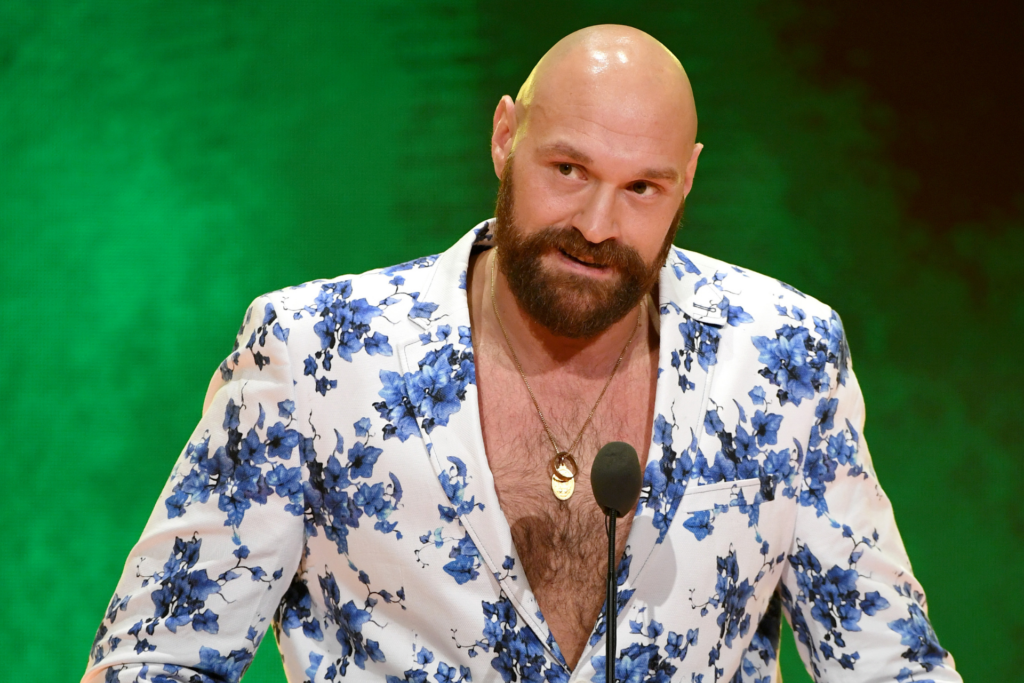Boxer was taunted about depression by Deontay Wilder in run-up to heavyweight title fight.
Tyson Fury’s struggle with his mental health was ridiculed by his opponent in the run-up to the most anticipated heavyweight title fight in decades. “Don’t you ever forget that when I found you, you were strung out on coke. You were like a big house, contemplating killing yourself,” Deontay Wilder said after an intense five-minute stare-down.
But for other boxers and mental health experts, Fury’s candid honesty about his struggle with depression and his journey back in the ring is something to be celebrated.
On Saturday, the 6ft 9in boxer, known as the Gypsy King, will face Wilder in a rematch for the American’s WBC heavyweight title on the Las Vegas strip. Though the initial bout ended in a controversial draw, Fury’s return to his feet after being knocked down shocked Deontay and the rest of world. “Finally got him. I’m celebrating, kisses to the wife …” Wilder later said while rewatching the match. “And then I turn around and there’s the Gypsy King, rising from the dead!”
The remarkable moment has come to represent Fury’s recovery and steered him to become an unlikely champion for mental health.
Fury spent three years out of the ring due to mental health issues after beating Wladimir Klitschko in 2015 to claim the WBA, IBF and WBO heavyweight titles. He battled depression, addiction and suicidal thoughts, which culminated in him nearly driving his Ferrari off a bridge at 190mph. Fury has said he “lost the will to live” and “prayed for death on a daily basis”.
Dr Benji Waterstones, an NHS psychiatrist working in London, pointed out that suicide was the biggest killer of men under 45, partly because of men’s traditional reluctance to open up. “Fury’s frankness is redefining outdated ideas of masculinity and what it means to be a ‘strong’ man. He shows you can compete to be the heavyweight champion of the world and be vocal about your mental health struggles, which is especially powerful in a testosterone-fuelled sport like boxing.”
Martin Bisp, who runs the pioneering gym Empire Fighting Chance (EFC) in Bristol, which supports vulnerable people struggling with their mental health by combining boxing and counselling, said boxers like Tyson make a huge difference when they opened up about their mental health problems.
“Boxers are superhuman, they are the toughest of the tough and they don’t get the credit they deserve when they say mental health affects them,” Bisp said. “These boxers are so important to getting the message out, especially from someone like Tyson, it makes a young person feel less ashamed. They think: ‘Who am I to be embarrassed by mental health when these champions have the same problem?’”
Waterstones said that Fury’s determination to keep fighting was “busting the myth that those with mental illness don’t recover. He’s been diagnosed with depression, addiction problems and been close to suicide. And yet he’s metaphorically peeled himself up off the canvas.”
And Fury isn’t alone. David Allen, a British heavyweight, made headlines when he said he pulled out of a fight to deal with his mental health. “They asked: ‘What’s going on, why are you not fighting?’ I said: ‘Look, I don’t feel up to it,’” Allen explained. “It wasn’t something I really mentioned to anyone involved in boxing. At the time, I didn’t want to share it because I felt like it was my own business.”
While Allen didn’t plan on making any announcement, he is glad he has been vocal about his depression and that Fury is doing the same. “I have felt much better since Tyson’s talking about it. You spend so much of your life living a lie, but there were moments where I wouldn’t leave the house and you become irritating to your friends when you’re a no-show. But now I would say I’m not coming out today and they know why.”
Allen, who has known Fury for several years, said the media had a habit of building him up and then tearing him down. “No one is squeaky clean, it just depends on how you look at people. I’ve known Tyson for several years and he isn’t squeaky clean, but he is a good man. He is a great fellow.”
As for Allen, being more honest with the world and himself has given him space to find his own way of managing his depression. “I’ve got my own method of dealing with things; lock myself in my house, get food and ride it out. It involves eating loads of Pringles.”
The full article on this can be found here.
If you are concerned with how you or someone you know are feeling and are finding it difficult to cope, please contact Oxfordshire Mind’s information line to speak to a wellbeing worker on 01865 247788 (Monday to Thursday, 9:30am to 4:30pm).
Alternatively, if you do not feel like talking on the phone, you can text into Oxfordshire Mind with your questions around mental health and wellbeing using the following number 07451 277973 (Monday to Thursday, 9am to 4pm).


